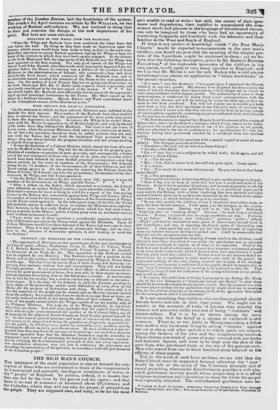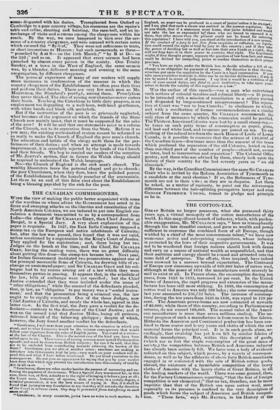THE RICH MAN'S CHURCH.
THE ignorance of the rural population is almost beyond the con- ception of those who are accustomed to think of the comparatively aye 1-instructed and generally intelligeat inhabitants of towns as the " people" of England. In politics, indeed, it is known that they are led by the nose by the parson and the squire; and that there is no sort of nonsense or falsehood about O'CONNELL and the Catholics which they will not take for gospel, if uttered from the pulpit. They arc supposed also, and truly, to be for the most part unable to read or write: but still. the extent of their igno- rance and degradation, their inability to comprehend the com- monest words and phrases in thelanguage of the educated classes', can only be imagined by those v. Ito have had an opportunity of conversing frequently and familiarly with the labourers and their families in the West and South of England. If them is any species of knowledge which " the Poor Man's Church " might be expected to communicate to the poor man's ehildren, one wouli sin pose that the meaning of the simpler por- tion. of the Catechism might be explained to them ; )et we be- lieve that the following lieteliptitet, given by Sit' ARTHUR BROOKS FAULKNER.* of the deplorable ignotance of the children in his own perish. would apply to eery many parishes in England; and we r. ar that Dr. MONK is Lot the only Bishop who would receive in contemptuous silence an upplicalion to " locate word-books" in the parish churches.
" It is. now," Nays Sir ARTHUR. "two year, Since i examined the Church children in toy own parish. lily absence fern England has been mainly the cause of my not repeating these examinatiens, Lich obliges me to revert to some me ..... random% of that begone period. 1 lie authenticity of twine of these stemma:intim:is is confirmed by miatly three years correspondence with the Bishop of my diocese, and will he nothieg the nom for their age, as they re. main to this hour unrefuted. You will eta require me to tiouble you with mute than a very few brief specimens of uut Chutch's style of spiritual in. etruction, when 1. assure you that they are not soy far from en ayelage sample of what might be supplied by 11S■111). g any given eurtfirtned child attic Church in the parishes to which I refer.
" Al y filet documeut is supplied ley a Deputy Lord. Lieutenant of the county of Glouci star; and is in the foini of a dialogue, which I copy almost to the letter. It presents the result of an reamiriation of tine I f the cliffilien iu hie parish, who weteadmitted to the rite of confirmation ; her qualification% for that dho- ti:10.km leaving been previously vouched by a certificate from her spiritual pastor.
" The examiner shaped his questions with a special regard to avoid all corn. plexity. The dialogue proceeds as follows.
" Examiner—My girl, tell tie who was Jesus Christ ?
" Answer—The 'Devil.
" Ex.— Cone, this is not a subject to be trifled with; think again, and tell me who wits Jesus Christ.
" A.—The Gospel.
6. EX.—Well, that is nearer to it, but still not quite right. Guess again.
" A.—Satan.
" Es. — You surely do not mean what you say. Do you not know that Satan is the Devil ?
" A.—The synagogue.
" The catechist, tire I out, at last was obliged to give up the attempt in despair. " Now 1 beg you to keep in mind that this was a confirmed child of the Church. I cite it for its peculiar blasphemy, and because apparently so wholly incredible. The dialogue we. published by me in a provincial paper, and a copy sent to the Bishop, with a letter imploring that very spiritual and right reverend lord to allow me to confirm the statement by the citation ado execs- sere testimony ; to which invitation he plod tie attention. In my own parish, the children whom I examined were either mute, or gave the most absurd answers. 1 will spate you the dialogue, as the revolt. dents were numerous. Exalts, was said to be the Lord.' Hallowed, ' forgiving sins,' or running about." Succour, ' to suck from a mother's breasts.' Pastor, a place to live in—to gip anywhere—to stay.' Per fin m, to go before' Reverent, was redeemed ; guiltless, ' guilty' defend, offend ;' and similar elucidations were given of almost every second word in the Catechism; and one, in repeating the Creed, spoke of • descending into heaven.' 1 must again beg your will not fell into the mistake of supposing
these are isolated instances invidiously picked out. I will be answerable that they are not the exceptions, but the rule.
" Any attempt to expound the meaning of these words to the children, could obviously have been of no kind of use, while the catechumen was as ignorant of the terms employed to explain as of those to be explained. None of the flunk had ever beard of a dictionary, or knew what it meant ; and seemed amused as by some trick on the cards, when I showed them how expeditiously I could find any given wool they called for. Neither was it to any purpose that I re- ferred them for a vocabulary to their teacher—the clerk of the parish : he motioninll nothing of the sort, having readied the heights of his theology without one, and deeming it sufficient that his pupil.' should be taught only to
• eay ' their CAtechism, leaving its meaning to be gathered in after life. This Gatnaliel is charged with the edification of the young Christians iu my parish, and is still in office.
" To remedy this awful state of things, I proposed to my Bishop, Dr. Monk —he of the two bishoprics ('" Gloucester turned into Bristol ")—that there should be word-books located at our perish-church. But the proposal net with no more attention than did nay application that he would allow nee to convince him, by the citation of proofs, or by autopsy itself, of the ignorance that called for the arrangement which I recommended. '
It is not surprising that children who are thus neglected should become brutes and sets in their riper years. We ought not to wonder at the accounts of trials of persons who plunder the farmers and peasantry under pretence of being " charmers" and lertune-tellers. For it is by no means among the mere labourers only that the belief in a species of e iteheraft is still common. There is, or was lately in NIuntgotner)shire, a fellow who made a very Land-owe living by selling " charms" against the rot in sheep and other maladies to which cattle are subject, among the iatmers of his own anti the neighbouring counties. These charms consisted of pieces of paper covered with pot-hooks and fantastic figures, and were to be kept next the skin of the poor dupe, who purchased thetn at the rate of five guineas each. Men who rented from one to three hundred acres believed in the efficacy of these papers.
Yet, in the teeth of such facts as these, we are told that the State Church must be supported because otherwise the " poor" would be left at the mercy of the Voluntary principle and of casual preaching, whereas the Establishment provides a well.edu- cated gentleman in every parish whose proper duty it is to afford religiuus instruction and consolation to those for whom the gospel was especially intended. The well-educated gentleman soon be- • Letters to Lord Brougham; presenting Rambling Details of a Tour through France, Switzerland, and ltal) ; whis soma Remarks on Home Polities. Published oe Kimono.
*times disgusted with his duties. Transplanted from Oxford or Cambridge to a poor country village, his resources are the squire's table and cellar, shooting and hunting, the race-ball, and an in- terchange of visits and sermons among the clergymen within his reach. By the way, we once happened to turn over the ser- mons of a country clergyman, and were amused with certain notes which covered the " tty-leaf," They were not references to texts, or short invocations to Heaven ; but such memoranda as these- " preached by A at S— on the 15th March ;" " by B at D— on the 22d ;" and so on. It appeared that every sermon had been yreached by almost every parson in the county. One Trinity Sunday, at a town in the West of England, the same sermon was, by a blunder, delivered morning and evening to the same congregation, by different clergymen.
The purse' al experience of many of our readers will supply more instances in confirmation of the manner in which the country clergymen of the Establishment too often pass their lives and perform their duties. There are very few such men as Mr. MORTIMER, the Standard's prot60, among them. Proselytism they never think of. The idea of raising new churches never enters their brain. Teaching the Catechism to little dirty paupers, is an employment too degrading to a well-born, well-bred gentleman, with white hands and black silk neckcloth.
But if the instruction of the poor is so grievously neglected, what becomes of the argument on which the friends of the State Church now mainly insist, that it must be supported for the sake of the poor? it will be said that our statements point to a reform of the Church, not to its separation from the State. Reform it as you may, the existing ecclesiastical system cannot be reformed so as really to make the Church of England the poor man's church. The education and habits of the clergy unfit them for the per- formance of their duties; and when an attempt is made towards improvement, it is scornfully rejected by the heads of' the Church and their friends. We beg to remind our readers of the reception of Mr. JERVIS'S motion, that in future the Welsh clergy should be required to understand the Welsh language. No—the Church of England is the rich man's church. The wealthy Dissenters leave the paternal chapel and go to church ; the poor Churchmen, when they dare, leave the polished parson of the Establishment for the homely preacher of the conventicle. Let there be an end of this false cant about the Establishment being a blessing provided by the rich for the poor.



























 Previous page
Previous page